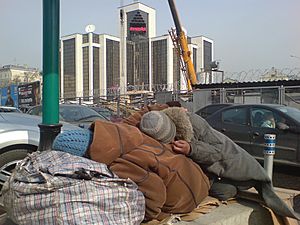Pauperism facts for kids
Pauperism is a word that describes being very, very poor. It's not just about having little money. It's often about needing help from the government or charities to live. In the past, especially in England, a "pauper" was someone who received official help under special rules called the English Poor Laws.
When someone became a pauper, it meant they were so poor they needed public support. This could be inside or outside special homes called almshouses. It also meant they might depend on help from charities for a long time. So, pauperism was different from just being poor. It meant you were officially getting help because you had nothing.
What Was a Pauper?
Under the old English Poor Laws, a person had to be truly destitute (meaning they had absolutely nothing) to get help. The moment they received this help, they became a pauper. Being a pauper meant losing some of your normal rights as a citizen. For example, you might not be able to vote.
The numbers about pauperism didn't show how many poor people there were in total. Instead, they showed how many people were actually receiving help from the Poor Law system.
Hard Times in Europe
The 1830s were a very difficult time for many people in Europe. There were big economic problems. Later in the 1800s, the number of people living in European countries grew a lot. This meant there were many more people looking for jobs than there were jobs available.
Many people moved from the countryside to bigger towns and cities. This is called urbanization. These cities often became very crowded, and people lived in poor areas called slums. Small businesses in towns found it hard to compete with cheaper goods coming from other countries, especially in England. When food prices went up, it made things even worse and led to widespread pauperism.
The End of the Poor Laws
Between 1918 and 1939, after World War I, there was still a lot of poverty in Britain. This led to new laws that slowly ended the old Poor Law system. The Local Government Act 1929 officially got rid of workhouses. Workhouses were places where poor people had to live and work to receive help.
Between 1929 and 1930, the groups that managed the Poor Laws (called "Poor Law Guardians") disappeared. The idea of the "workhouse test" (where you had to go to a workhouse to prove you needed help) also ended. And the term "pauper" itself was no longer used officially.
See also
- Debtors Anonymous
- Pauper's funeral
- Reserve army of labour
- Social exclusion
- Social stigma
- The Prince and the Pauper
- Working poor
 | Emma Amos |
 | Edward Mitchell Bannister |
 | Larry D. Alexander |
 | Ernie Barnes |


